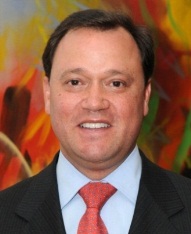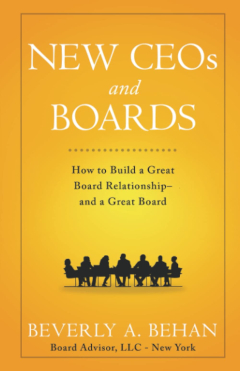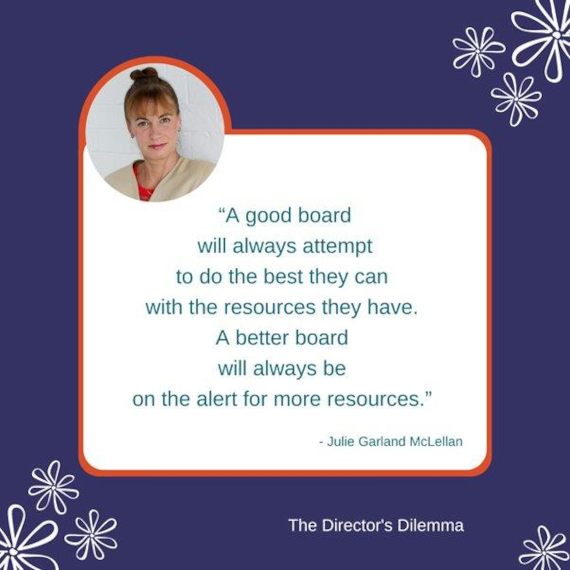|
|
|
|
|
|
|
|
|
Dear reader,
Welcome to The Director's Dilemma September 2022
Each month this newsletter looks at a real-life scenario that happened to a board, perhaps to a board like yours, and considers a range of responses. The scenarios are de-identified to protect the individuals concerned. This month we look at the difficulty of deciding whether to step up into a more onerous role or whether to remain on the sidelines as an organisation goes through a period of difficult changes.
I work with boards and directors as a confidential mentor to help them build great companies and maximise their impact, and if you would like coaching from an experienced board mentor, please call me.
To read this email in a web browser, go to www.mclellan.com.au/newsletter.html and click on 'read the latest issue'. I hope you will enjoy the latest dilemma:
 Vaughn is a director on the board of an aged care charity. He is passionate about the role and, although he has a very demanding job, makes sure that he sets aside enough time to fulfill his duties and add value. Vaughn is a director on the board of an aged care charity. He is passionate about the role and, although he has a very demanding job, makes sure that he sets aside enough time to fulfill his duties and add value.
Recently there was some tension with the staff; three senior staff members came separately to the board with complaints about the CEO. These were carefully investigated with the help of a local law firm. Before the investigation was complete, the regulator conducted an audit and found several non-compliances and many opportunities for improvement.
The CEO immediately resigned and took all his accumulated leave, asking for the remainder of the notice period to be paid out rather than served.
The chair agreed to this and then she resigned. The organisation is now faced with searching for a new CEO and chair whilst working closely with the regulator to implement the audit findings and restore confidence in the organisation.
Vaughn's board colleagues have asked him to step up to the chair role. Vaughn is concerned that he doesn't have the time available to do the role justice, especially when the staff will be looking to the chair to provide leadership while there is no CEO. He simply can't see where he would be able to find the extra hours without causing tension at home or neglecting his job. None of the other directors are able or willing to take on the role. They are all looking to Vaughn to save the company.
What should he do?
|
|
|
|
Trish's Answer
 The situation described demonstrates governance, operational and cultural issues and resolution should be approached in an organised, structured and objective manner. Upon stepping up, Vaughan should remind himself of the role of the (interim) Chair ie. governance - work on the issue, not in the issue. The situation described demonstrates governance, operational and cultural issues and resolution should be approached in an organised, structured and objective manner. Upon stepping up, Vaughan should remind himself of the role of the (interim) Chair ie. governance - work on the issue, not in the issue.
Firstly, identify all risks and prioritise the mitigation of these. The most business critical risk is non-compliance identified by the audit. Resource the resolution of this with an interim CEO and the team members who initially raised the issue. This requires his oversight in the immediate short-term. At the same time, communicate with staff and Board why this course of action has been taken. This will demonstrate the leadership required to provide staff confidence, helping to maintain their support in the months ahead.
Secondly, and a wider issue for the business, are the identified opportunities for improvement. Any change needs considered thought and time and is best brought about by a new CEO. Their recruitment is next and starts once Vaughan is assured resolving the business-critical risk is being well managed. The recruitment must be accompanied with full disclosure of the current state of the business and involve a Board Sub-Committee.
Thirdly, it might be opportune for board renewal and/or skills development and Vaughan, through an independent advisor, could oversee this undertaking in parallel to the new CEO recruitment process. Once these steps have been completed, Vaughan will be in a better position to determine his role on and longer-term commitment to the Board.
Trish Egan is a director of Thoroughbred Breeders NSW, Chair of Australian Turf Club Charitable Foundation and Trustee of Racing NSW Thoroughbred Welfare Fund. She is based in Sydney, New South Wales, Australia.
|
|
|
|
Julie's Answer
 Vaughn is passionate about this company. He knows that it deserves a chair who can dedicate significant time to helping it recruit an excellent CEO, handle repercussions from the recent departure of the former CEO with staff and other stakeholders, and credibly represent the organisation as it rebuilds trust with the regulator and the residents. If he is sure that he can't dedicate that time, then he must regretfully pass on the opportunity to step into the role. Vaughn is passionate about this company. He knows that it deserves a chair who can dedicate significant time to helping it recruit an excellent CEO, handle repercussions from the recent departure of the former CEO with staff and other stakeholders, and credibly represent the organisation as it rebuilds trust with the regulator and the residents. If he is sure that he can't dedicate that time, then he must regretfully pass on the opportunity to step into the role.
That doesn't mean he can just decline and wait to hear in his board papers how the other directors have sorted out the mess!
He should convene a brief meeting with his co-directors and work to develop a specification of an excellent new chair; listing all the experiences, qualifications, relationships, and likely time commitment of an ideal candidate. When everyone is agreed on what the next chair should look like they can search their networks for someone similar. If they don't find anyone, they can try advertising the role on one of the director job boards. Many will not charge a not-for-profit to advertise on their site.
They should also talk to any executive search consultants or specialist board recruiters. They may have to pay a fee to find a replacement, even though the position is voluntary, and should consider this an investment in building the right future for their company under the right leadership.
Julie Garland McLellan is an experienced non-executive director and board advisor based in Sydney, Australia. She travels the world providing director education and board development.
|
|
|
|
Santiago's Answer
 My first recommendation is to separate the Chair and CEO roles. Strict independence is needed for a healthy and sustainable corporate governance practice in the board structure. The Chair holds an advisor role and the CEO an executor role. The board members advise strategy for the successful performance and leadership of the organization. My first recommendation is to separate the Chair and CEO roles. Strict independence is needed for a healthy and sustainable corporate governance practice in the board structure. The Chair holds an advisor role and the CEO an executor role. The board members advise strategy for the successful performance and leadership of the organization.
For Vaughn to accept this challenge he would need to delegate the execution of the company's strategy, especially due to the lack of time he has. I suggest mapping talent inside the organization for an interim CEO that could continue executing the day-by-day activities until the external search process is completed.
This process would include the evaluation of the management team to find out who could be the most suitable candidate to take on the CEO responsibilities and consequently giving the board an additional source of candidates to be compared with the externals.
The evaluation of the internal candidates should be part of the talent development strategy and it should be based not only on the competencies and experience required for the CEO role, but also include the assessment of personal characteristics and cultural alignment needed for the success of the role. This requirement would be for both internal and external candidates.
After the evaluation and appointment of the interim CEO, Vaughn would continue with his advisory role activities, delegating strategy to be executed. This would allow him to continue his regular activities and at the same time administer board's traditional duties.
Santiago Solis Arias is a global AltoPartners board member, General Manager of Executive Connection S.A.S / AltoPartners Colombia and spent several years in leadership roles in the finance and construction sectors. Santiago is based in Bogota, Colombia.
|
|
|
|
Short practical videos
My recent video on how to read board papers was the most popular I have ever posted. You might like to visit and subscribe to my YouTube channel to see that and all the other videos. There are now over 60 short videos on a range of board topics. Let me know of any topics you would like to see addressed and I will see if I can make a video for you. Please subscribe so you can find it again at a later date. I promise I won't send you spam from YouTube!
Let me help you - I would be delighted to speak for or train your board, staff, audience and/or group. If I can help, please contact me at julie@mclellan.com.au.
Book Review - New CEOs and Boards: How to Build a Great Board Relationship - and a Great Board by Beverley Behan.

Many new CEOs will tell you that the most perplexing part of their new role was working out how to report to a group rather than an individual. Until you become CEO and report to a board, it is unlikely that you will ever experience this or learn how to do it well.
This great book by the author of Good Companies Deserve Great Boards and Becoming a Boardroom Star (both of which I have reviewed previously) starts with a healthy expectation-setting – outlining how much time CEOs should spend on board-related issues and the key topics that boards will expect the CEO to canvas with them. It also has a handy section on the differences between reporting to non-executives who will use influence and insight rather than executives who will use authority to direct your actions.
The next two chapters consider how to establish a working arrangement with your board members and how to strengthen (or build) a senior executive team that can enhance your relationship with the board.
The book then boldly surges into the dangerous territory of how to improve a board from the CEO role. It managed to do so without alienating me. Finally the book gave some helpful ideas on improving performance by dealing with director performance. This included a very handy section on different types of board review and when each is most indicated.
Available at Amazon.
Inspirational quote for September
This month my favourite quote is:

Don't buy into the theory that what you have is all you can get. Your board deserves the best and you can probably get it if you are alert and willing to invest.
Focus your director and board development
Boards often struggle to get cut through and drive company performance. They work hard, then they work harder, then call in a consultant who recommends some changes, then they work harder still.
If that sounds like your board, don't worry. It is likely that you have simply been focusing on the wrong stuff. I have made a diagnostic tool that might help you to prioritise the actions that will free your board from the drudgery and allow you to maximise your impact. You can take the diagnostic here:
https://directorsdilemma.scoreapp.com
Call me afterwards for a personalised action plan to revitalise and enhance the impact of your board work.
A note on names - A few readers have asked me where I find the names for the protagonists in each case study; I 'borrow' them from people I meet or things that I read. Vaughn is an old British name (possibly English possibly Welsh) and means 'Little' or 'Small'. Our protagonist Vaughn needs to decide whether he wants to continue playing his small role or step up into a larger one. That is never a little decision and has pros and cons either way. Even if he decides not to step up, he still has a large role to play in finding someone else to fill that important role.
This newsletter - If you have any ideas for improving the newsletter please let me know. If you are reading a forwarded copy, please visit my website and sign up for your own subscription.
Suggestions for dilemmas - Thank you to all the readers who have suggested dilemmas. They are greatly appreciated. I will answer them all eventually. I could not write this newsletter without your help and without the generous help of all the experts who respond each month to the case studies.
Be a contributor - if you would like to attempt a response to the dilemmas for publication you will be most welcome. Simply reply to this email and let me know. I am always on the look out for new talent from around the world so please reach out if that sounds like something you could do. I am also always grateful for the generous sharing of the current and past contributors. I couldn’t create such an engaging newsletter without their help.
Let's connect - I use LinkedIn to share information about boards and directorship with my friends and acquaintances. If you use LinkedIn and we are not yet connected I will welcome a connection from you. You can find me at linkedin.com/in/juliegarlandmclellan.
Farewell until the next issue due 1 October 2022. I look forward to greeting you again then.
Enjoy governing your companies!
Best regards,
Julie

Main photo by Fauxels
Quote picture by Keitchy Sanchez for Julie Garland McLellan
Disclaimer: The opinions expressed above are general in nature and are designed to help you to develop your judgement as a director. They are not a definitive legal ruling and do not constitute legal advice. Names and some circumstances in the case study have been changed to ensure anonymity. Contributors to this newsletter comment in the context of their own jurisdiction; readers should check their local laws and regulations as they may be very different.
Privacy: I am privileged to have your contact details and keep them as safely as possible. I will alert you if they are ever accessed by any unauthorised person (the technical staff at ayuda help with publishing and issuing the Director's Dilemma and have access so they can send the newsletters to you). I do not sell your details to anyone; they are kept only for the intended purpose - sending you this newsletter and helping to build the judgement of company directors by providing a safe way to consider potential responses to real life events.
|
|
|
|
|
|
|
 Vaughn is a director on the board of an aged care charity. He is passionate about the role and, although he has a very demanding job, makes sure that he sets aside enough time to fulfill his duties and add value.
Vaughn is a director on the board of an aged care charity. He is passionate about the role and, although he has a very demanding job, makes sure that he sets aside enough time to fulfill his duties and add value.
 The situation described demonstrates governance, operational and cultural issues and resolution should be approached in an organised, structured and objective manner. Upon stepping up, Vaughan should remind himself of the role of the (interim) Chair ie. governance - work on the issue, not in the issue.
The situation described demonstrates governance, operational and cultural issues and resolution should be approached in an organised, structured and objective manner. Upon stepping up, Vaughan should remind himself of the role of the (interim) Chair ie. governance - work on the issue, not in the issue. Vaughn is passionate about this company. He knows that it deserves a chair who can dedicate significant time to helping it recruit an excellent CEO, handle repercussions from the recent departure of the former CEO with staff and other stakeholders, and credibly represent the organisation as it rebuilds trust with the regulator and the residents. If he is sure that he can't dedicate that time, then he must regretfully pass on the opportunity to step into the role.
Vaughn is passionate about this company. He knows that it deserves a chair who can dedicate significant time to helping it recruit an excellent CEO, handle repercussions from the recent departure of the former CEO with staff and other stakeholders, and credibly represent the organisation as it rebuilds trust with the regulator and the residents. If he is sure that he can't dedicate that time, then he must regretfully pass on the opportunity to step into the role. My first recommendation is to separate the Chair and CEO roles. Strict independence is needed for a healthy and sustainable corporate governance practice in the board structure. The Chair holds an advisor role and the CEO an executor role. The board members advise strategy for the successful performance and leadership of the organization.
My first recommendation is to separate the Chair and CEO roles. Strict independence is needed for a healthy and sustainable corporate governance practice in the board structure. The Chair holds an advisor role and the CEO an executor role. The board members advise strategy for the successful performance and leadership of the organization.

